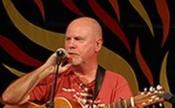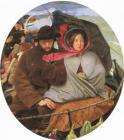The sun's gone down, the shutters drawn
The curfew bell has tolled
The fox is lurking round the farm
The barn owl's wings unfold
In the candle light tonight you might, hear to your alarm
The midnight band of Captain Swing as he rides from farm to farm
All over Dorset the flames are leaping high
The ricks are burning, who's the cause?
Captain Swing not I!
The sheep are safely in the fold
The shepherd deeply sleeps
The ploughman reels back from his drink
Through woods the poacher creeps
The squire retires on bed of brass with one thing on his mind
If Captain Swing's this way tonight there'll be no corn to grind
All over Dorset the flames are leaping high
The ricks are burning, who's the cause?
Captain Swing not I!
The labouring man is on his knees
Nowhere can he get hired
Since new machines that do the work, the farmer has acquired
But how he sweats when he reads the threats on paper morning brings
Destroy your gear or else I swear you'll pay, Signed Captain Swing
The curfew bell has tolled
The fox is lurking round the farm
The barn owl's wings unfold
In the candle light tonight you might, hear to your alarm
The midnight band of Captain Swing as he rides from farm to farm
All over Dorset the flames are leaping high
The ricks are burning, who's the cause?
Captain Swing not I!
The sheep are safely in the fold
The shepherd deeply sleeps
The ploughman reels back from his drink
Through woods the poacher creeps
The squire retires on bed of brass with one thing on his mind
If Captain Swing's this way tonight there'll be no corn to grind
All over Dorset the flames are leaping high
The ricks are burning, who's the cause?
Captain Swing not I!
The labouring man is on his knees
Nowhere can he get hired
Since new machines that do the work, the farmer has acquired
But how he sweats when he reads the threats on paper morning brings
Destroy your gear or else I swear you'll pay, Signed Captain Swing
inviata da Bernart Bartleby - 27/4/2015 - 16:21
×
![]()






Parole e musica di Graham Moore
Nel suo disco intitolato “Tolpuddle Man”
Interpretata anche da Roy Bailey nel suo “Coda” del 2000.
Negli anni 30 dell’800 nelle campagne inglesi fecero la loro comparsa le prime macchine agricole, così come alcuni decenni prima erano comparsi i telai meccanici nelle fabbriche tessili. L’accoglienza, anche in questo caso, non fu buona, perché accompagnata da licenziamenti di massa e diminuzione delle paghe. Nelle campagne inglesi del Sussex e del Kent gruppi di manifestanti cominciarono ad attaccare le proprietà per distruggere le macchine o appiccare il fuoco ai covoni mietuti con esse. In alcune zone, le azioni vennero annunciate con lettere minatorie a firma “Swing”:
“Sir, Your name is down amongst the Black hearts in the Black Book and this is to advise you and the like of you, who are Parson Justasses, to make your wills. Ye have been the Blackguard Enemies of the People on all occasions, Ye have not yet done as ye ought,... Swing”
“Sir, This is to acquaint you that if your threshing machines are not destroyed by you directly we shall commence our labours... Swing”
“Captain Swing” divenne quindi il simbolo dei rivoltosi, anche se i danni furono limitati e la gran parte delle manifestazioni di protesta furono in realtà pacifiche. In ogni caso la repressione fu molto dura: centinaia gli imprigionamenti, centinaia le deportazioni nelle colonie penali australiane, una ventina almeno i giustiziati.
Negli stessi anni - che seguivano di poco l’abrogazione dell’infame “Combination Acts” che fino ad allora aveva impedito ai lavoratori di organizzarsi tra di loro per ottenere migliori condizioni – un gruppo di braccianti di Tolpuddle, un villaggio nel Dorset, costituirono tra di loro una società segreta di mutuo soccorso, la Friendly Society of Agricultural Labourers, per lottare insieme contro le diminuzioni salariali che costantemente colpivano la loro categoria. La cosa allarmò i proprietari terrieri locali, i quali chiesero aiuto alle autorità… Fu così che nel 1833 gli artefici dell’iniziativa furono arrestati, processati e condannati ai bagni penali in Australia, e solo per aver creato una piccola cellula sindacale. I “Tolpuddle Martyrs” – cui è dedicato il titolo del disco di Graham Moore da cui è tratta questa “Captain Swing” - furono liberati tra il 1836 ed il 1837.